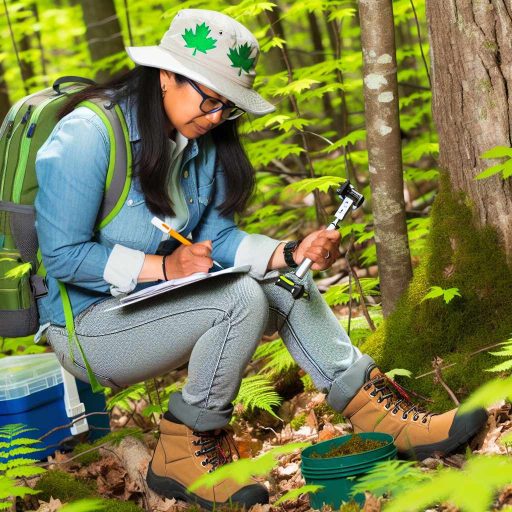Introduction to Wildlife Biology as a Career in Canada
Wildlife biology offers a unique career opportunity in Canada.
This field focuses on the study and management of wildlife populations.
Wildlife biologists assess the health of ecosystems and species.
They gather data on animal behavior, habitats, and conservation needs.
This profession is vital for protecting Canada’s diverse wildlife.
Educational Pathways
Most wildlife biologists hold a degree in biology or ecology.
Many universities across Canada offer specialized programs.
Practical experience through internships is highly beneficial.
Fieldwork skills are essential for success in this career.
Key Responsibilities
Wildlife biologists conduct research on animal populations.
They monitor habitats and assess environmental impacts.
Additionally, they develop conservation strategies and policies.
Collaboration with government agencies is a common aspect of the job.
Career Opportunities
Wildlife biologists can work for governmental and non-governmental organizations.
Many find roles within conservation groups and universities.
A diverse job market exists, offering various specializations.
Some professionals focus on specific species, like birds or mammals.
Impact of Wildlife Biology
Wildlife biologists play a critical role in ecosystem management.
They help ensure the sustainability of natural resources.
Furthermore, their work supports biodiversity conservation efforts.
In Canada, preserving wildlife is essential for cultural and ecological reasons.
Overview of Wildlife Biologist Salaries
National Averages
Wildlife biologists play a crucial role in ecosystem conservation.
In Canada, salaries for wildlife biologists vary significantly.
The average salary for a wildlife biologist is approximately CAD 70,000 per year.
However, this figure can fluctuate based on various factors.
Unlock Your Career Potential
Visualize a clear path to success with our tailored Career Consulting service. Personalized insights in just 1-3 days.
Get StartedSuch factors include experience, education, and geographic location.
Factors Influencing Salaries
Experience is a key determinant of salary levels.
Entry-level positions may offer lower starting salaries.
Conversely, seasoned professionals often earn substantially more.
Education also impacts salary potential.
A master’s degree typically leads to higher earnings.
Moreover, specialized training in certain areas is beneficial.
Geographic location plays a significant role as well.
In provinces like British Columbia, salaries tend to be higher.
Urban areas often provide more job opportunities than rural settings.
Salary Ranges Across Regions
Wildlife biologist salaries differ across Canadian provinces.
In British Columbia, salaries can reach up to CAD 85,000 annually.
Ontario also offers competitive wages, averaging CAD 75,000 per year.
In contrast, salaries in Atlantic Canada may be lower.
For example, provinces like New Brunswick have averages of CAD 60,000.
Career Advancement Opportunities
Many wildlife biologists seek advancement to increase their earnings.
Positions such as senior biologist or program manager offer higher salaries.
These roles often require additional responsibilities and leadership skills.
Networking and professional development are essential for growth.
Engaging in conferences and workshops can open new opportunities.
Furthermore, gaining certifications can enhance job prospects.
Factors Influencing Wildlife Biologist Salaries in Canada
Education and Qualifications
A wildlife biologist’s education significantly affects their salary.
Higher degrees often lead to better-paying positions.
Many employers prefer candidates with advanced degrees.
Field experience also plays an important role.
Candidates with specialized training may command higher salaries.
Location
The region where a wildlife biologist works matters greatly.
Urban areas generally offer higher salaries than rural ones.
For example, biologists in Vancouver typically earn more than those in smaller towns.
Geographical differences can reflect the local cost of living.
Type of Employer
The employer type influences wage levels significantly.
Biologists in government positions often earn stable salaries.
Nonprofit organizations may offer lower pay but additional benefits.
Research institutes may provide competitive salaries too.
Experience Level
Experience directly correlates with salary increases.
Entry-level positions generally pay less.
Biologists with years of experience command higher wages.
Senior roles often come with increased responsibilities and pay.
Specialized Skills
Specialized skills can make a biologist more valuable.
Knowledge in genetics or environmental policy often attracts higher pay.
Skills in data analysis or GIS technology can enhance salary prospects.
Biologists who can mentor others may also earn more.
Job Demand and Market Trends
High demand for wildlife biologists can push salaries upward.
Emerging conservation issues often create new job opportunities.
Market trends also impact ongoing salary negotiations.
Staying updated with industry demands is crucial.
Find Out More: Popular Geology Specializations and Career Paths
Comparison of Salaries Across Provinces and Territories
General Overview
Wildlife biologist salaries vary significantly in Canada.
This variation depends on geographical location and local demand.
Each province and territory presents unique salary scales.
Understanding these differences helps aspiring biologists make informed decisions.
Western Canada
In British Columbia, wildlife biologists earn competitive wages.
Average salaries can reach up to $85,000 annually.
Alberta follows closely with average salaries around $80,000.
In addition, Saskatchewan offers competitive rates, averaging $75,000.
Job opportunities in these provinces remain high due to active conservation efforts.
Central Canada
Ontario showcases a diverse job market for wildlife biologists.
The average salary here is approximately $78,000 per year.
Quebec generally offers similar wages, averaging $76,000 annually.
Additionally, job security remains stable due to governmental initiatives.
Atlantic Canada
Nova Scotia and New Brunswick have emerging wildlife biology markets.
Here, salaries range from $65,000 to $70,000 annually.
Despite lower salaries, these provinces offer meaningful job roles.
Effective conservation programs are in demand across the region.
Northwest Territories and Yukon
Wildlife biologists in these territories encounter unique challenges.
However, wages can be significantly higher than in other regions.
Average salaries range from $85,000 to $95,000 annually.
Incentives often include remote living allowances.
Implications for Aspiring Wildlife Biologists
Salaries for wildlife biologists exhibit regional diversity.
Prospective biologists should engage in thorough research.
Understanding local salary ranges will guide career choices effectively.
Uncover the Details: Networking Tips for New Ecologists in Canada
Education and Experience Impact on Salary Levels
Importance of Education
Education plays a crucial role in determining wildlife biologist salaries in Canada.
Typically, a bachelor’s degree is the minimum requirement for entry-level positions.
According to recent data, holding a master’s degree can significantly enhance earning potential.
Additionally, specialized training in fields like ecology or conservation biology is beneficial.
Influence of Experience
Experience is equally vital in shaping salary levels for wildlife biologists.
Entry-level positions may offer lower salaries due to limited experience.
However, professionals with five to ten years of field experience often saw substantial salary increases.
Moreover, leadership roles, such as project managers, command higher wages.
Job Location Factors
Geographic location impacts the salary of wildlife biologists as well.
Regions with abundant wildlife and research opportunities tend to offer better compensation.
For example, areas in British Columbia or Alberta often pay higher salaries.
Conversely, remote or less populated regions might offer lower wages.
Sector of Employment
The sector in which a wildlife biologist works also affects their salary.
Government positions typically offer stable salaries with benefits.
In contrast, non-profit organizations may provide lower initial wages with potential for growth.
Additionally, private sector jobs often pay more, but may demand longer hours.
Continuing Education and Certification
Continuing education and certification can lead to better salary prospects.
Wildlife biologists who pursue additional certifications enhance their expertise.
This professional development often results in promotions and salary increases.
Certifications from recognized organizations can distinguish professionals in a competitive field.
You Might Also Like: The Connection Between Oceanography and Global Science

Job Prospects and Salary Growth in Wildlife Biology
Current Job Market for Wildlife Biologists
The job market for wildlife biologists in Canada is competitive.
However, the demand for professionals in this field continues to grow.
Employers seek expertise in ecology, conservation, and environmental science.
Additionally, the government invests significantly in biodiversity initiatives.
Nonprofit organizations also contribute to job creation.
Salary Overview for Wildlife Biologists
The salary for wildlife biologists varies based on experience and location.
As of 2023, the average annual salary is approximately CAD 70,000.
Entry-level positions start around CAD 50,000 per year.
On the other hand, senior professionals can earn over CAD 90,000 annually.
Factors Influencing Salary Growth
Several factors influence salary growth in wildlife biology.
Education and advanced degrees play a significant role.
Certification and specialization can lead to higher pay.
Experience also increases earning potential significantly.
Future Outlook for Wildlife Biologist Salaries
The future looks promising for wildlife biologist salaries in Canada.
As public awareness of conservation grows, so does funding for wildlife projects.
This trend indicates potential salary increases in the coming years.
Moreover, expanding job opportunities enhance overall salary prospects.
You Might Also Like: Steps to Land a Job as a Geneticist in Canada
Benefits and Bonuses: Beyond Base Salary for Wildlife Biologists
Overview of Additional Compensation
Wildlife biologists often receive additional compensation beyond their base salary.
These benefits can significantly enhance overall earnings.
Moreover, bonuses can vary by employer and region.
Health and Wellness Benefits
Many organizations offer health insurance as a standard benefit.
This usually includes medical, dental, and vision coverage.
Additionally, some employers provide wellness programs.
Such programs may include gym memberships and mental health resources.
Retirement Plans
Retirement plans are crucial for long-term financial security.
Wildlife biologists may have access to pension plans and 401(k)s.
Employers often match contributions to encourage savings.
This results in greater financial stability for employees.
Bonuses Based on Performance
Performance-based bonuses can boost overall income significantly.
These are typically awarded for meeting specific goals.
Recognition of exceptional work motivates biologists to excel.
Furthermore, team-based incentives promote collaboration.
Professional Development Opportunities
Organizations may fund training and certifications.
These opportunities enhance skills and career advancement potential.
Additionally, attending conferences can lead to valuable networking.
This exposure can open doors for future job opportunities.
Paid Time Off and Flexibility
Paid time off (PTO) is an essential benefit for wildlife biologists.
This typically includes vacation, sick leave, and holidays.
Some employers offer flexible work arrangements as well.
This flexibility supports a healthy work-life balance.
Specialized Equipment and Resources
Employers often provide specialized equipment for fieldwork.
This equipment enhances efficiency and ensures safety.
Additionally, access to research resources can aid in data collection.
Such provisions help biologists perform their jobs more effectively.
Resources and Tools for Tracking Wildlife Biologist Salaries in Canada
Government Resources
The Canadian government provides various resources to track wildlife biologist salaries.
Statistics Canada, for example, offers comprehensive wage data.
You can access detailed occupational information on their website.
Moreover, provincial governments often publish localized salary reports.
This allows for comparisons across different regions within Canada.
Industry Reports
Several organizations release annual reports on wildlife biology salaries.
Organizations like the Canadian Wildlife Federation publish sector-specific salary surveys.
These reports provide insights into trends and averages across the country.
Additionally, environmental consulting firms often compile salary data.
They base their findings on industry standards and employee feedback.
Professional Associations
Joining professional associations can be beneficial for wildlife biologists.
Organizations like the Ecological Society of America offer member resources.
These resources frequently include salary benchmarks and industry insights.
Furthermore, networks of professionals can provide valuable anecdotal data.
This can help biologists gauge their worth in the job market.
Job Portals and Salary Websites
Online job portals are excellent for salary information.
Websites like Glassdoor and Payscale offer salary estimates for various roles.
They aggregate user-submitted data for accuracy and comprehensiveness.
Additionally, job postings often list salary ranges for open positions.
This can help you understand current market trends and demands.
Networking and Conferences
Networking at conferences can yield valuable compensation insights.
Attending events, such as those hosted by the Canadian Society of Zoologists, is beneficial.
These gatherings allow professionals to discuss salaries and job expectations.
Moreover, informal conversations may reveal useful information about compensation packages.
Building a professional network can lead to new job opportunities as well.
Additional Resources
NAWMP Webinar Series | NawmpRevision.org
Becoming a Pilot Biologist for the U.S. Fish and Wildlife Service …




